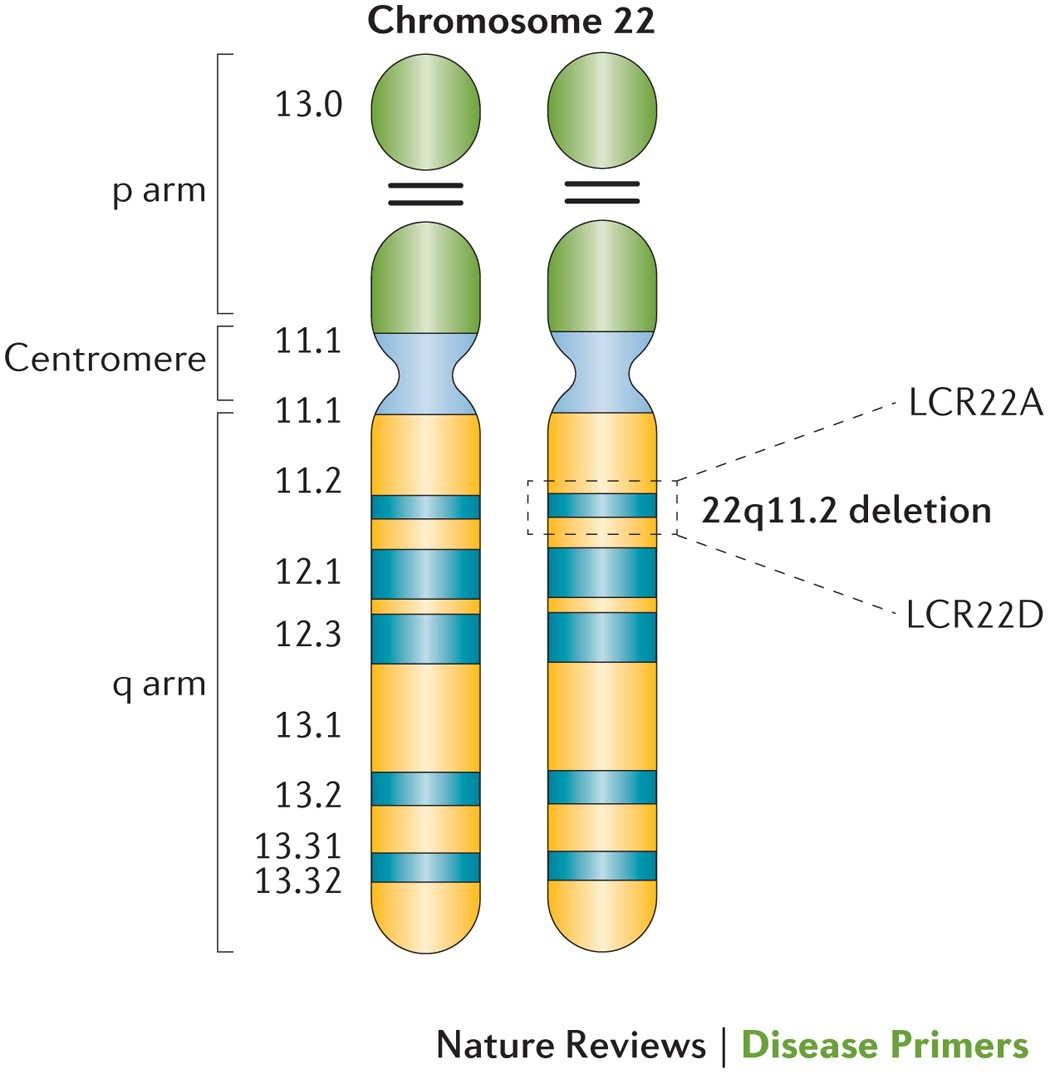What is Schizophrenia?
Schizophrenia is a mental disorder characterized by symptoms including hallucinations, delusions, thought disorders and movement disorders. People with schizophrenia may also experience reduced positive emotions, and difficulty focusing. Scientists believe that schizophrenia can be both inherited and caused by the environment around an individual. Schizophrenia is typically begins between the ages of 16 and 30 and is more common in males than females. Approximately 0.4% of the population experience this genetic trait.

What Causes Schizophrenia?
Scientists believe that many different genes can contribute to the possibility of an individual developing schizophrenia. Some studies have put the number as high as 22,000 different genes contributing to the development of schizophrenia. A microdeletion in chromosome 22 called 22q11 has been identified as most commonly linked to schizophrenia. Because of the sheer number of different genes scientists suspect increase the risk of schizophrenia, I will focus on the 22q11 mutation. This mutation deletes between 30 and 40 genes in the middle of chromosome 22.
One of the genes that is typically deleted by this mutation is the COMT gene. This gene codes for an enzyme called catechol-O-methyltransferase which is found in the brain, liver, kidneys and blood. In the brain, the enzyme helps control certain hormones and is typically found in the prefrontal cortex. The prefrontal cortex is involved with personality, planning, behavior, abstract thinking, emotion and memory. The enzyme helps maintain sufficient levels of other neurotransmitters in the prefrontal cortex which affect the abilities above.
- When this gene is deleted by the 22q11 mutation it affects the production of the enzyme in the brain. The loss of this enzyme affects the ability to maintain the levels of the neurotransmitters in the prefrontal cortex. This can affect the functions of this portion of the brain.
Another gene deleted by the mutation is the TBX1 gene. This gene is responsible for the formation of tissue and organs in embryonic development. The proteins created by this gene are specifically used for development of muscles and bones in the face and neck.
- When this gene is deleted by the 22q11 mutation is affects the production of the proteins. While this can cause visible changes and other medical conditions it is believed that the loss of this gene also affects behavior.

Genetic Testing for Schizophrenia
A person may want to get a genetic test because it will help them understand if they are at a higher risk for schizophrenia. Because of the number of genes thought to affect the probability of getting schizophrenia there are no tests that can accurately examine all the variables. The best option is to have a full genome sequencing because it will best be able to identify all the genes in question. However, this costs approximately $1325. A more cost effective option would be single gene sequencing. In single gene sequencing a person could examine the most common alleles causing schizophrenia such as COMT and TBX1.

Conclusiveness of Genetic Testing
There is evidence supporting a connection between these mutations and having schizophrenia. However, solely having these mutations does not mean a person will have schizophrenia. There are many different genes at play in this condition, but having these mutation will increase the chance.
Most people who have a family member who have schizophrenia will not have the condition. However, their chances are elevated compared to the average. There is no known inheritance pattern or measurable likelihood of having the condition.
Approximately 0.4% of the population have schizophrenia. Approximately 1% of people who have schizophrenia have the 22q11 deletion. Therefore if you have the variation you have a slightly elevated risk of developing schizophrenia.
Pros and Cons of Genetic Testing
Only 0.4% of the population have schizophrenia so the odds of a person having the condition are quite low. If a person has a history of schizophrenia it may be worth it to get the test done. People with a history of the condition in their family are more likely to have the disease than others. However, if there is no history of schizophrenia in your family the odds are even lower. Additionally, there are numerous variations that can cause the condition so even if the genetic test for the 22q11 deletion comes back negative a person may still have a risk of getting the condition. Also, even if a person does test positive for having the 22q11 deletion mutation they are not guaranteed to have schizophrenia it may only increase their chances.
If a person gets the test they may be fooled by the results. For example, if the person gets results that say that they have the mutation they may be worried about getting schizophrenia. However, even if they have this mutation they only have a 25% chance of having the condition. This may cause unnecessary worrying by the individual who has the test. In addition, there are many different genes which contribute to the probability of having the condition so one genetic test cannot give the individual accurate knowledge of their risk of having the condition.
The consumer may also have to worry about genetic privacy concerns. Some companies that conduct genetic testing may sell the results or may be susceptible to hacking which will jeopardize the privacy of the results. If the results are leaked the consumer may worry about discrimination in the workplace if the employer has access to the results.

Studies on Schizophrenia and Genetic Testing
There was one study that I could find on how people react to knowing their genetic likelihood of having schizophrenia. In this study it was found that people who were genetically more likely to have the condition often told people about their diagnoses and some people were even considering telling their employer.
What to do after a Genetic Test
If a person tests positive or negative they should not overreact. Neither positive nor negative test results are conclusive. If a person tests positive they may want to be conscious of the symptoms of schizophrenia. Then they could be conscious of whether they are feeling the effects of the condition and take measures to prevent it from progressing too far. Also if a person tests positive they could take steps to avoid certain activities that may put them more at risk for developing the condition. The best ways to avoid the development of schizophrenia is avoiding drugs (including alcohol) and socializing with others.
It would be helpful to tell a doctor if you have an increased risk of schizophrenia because the doctor can look out for symptoms of the condition. Often a person who has schizophrenia will not be in a good mental state so they may not voluntarily tell their doctor of their altered mental state. If the doctor knows that their patient is at higher risk of the disorder they may be more likely to notice any psychological changes.
If a person tests positive they should have psychological testing done. This will help them understand if they do have the condition and what to look out for within their mental state.
If a person thinks they are at a higher risk for developing schizophrenia they can make some efforts to lower those risks. They should avoid drugs and not overindulge on alcohol. In addition, they should try to be social and gain a positive perspective on the world. Doing these things will reduce the chances that a person develops schizophrenia.

Sources
Bhugra, Dinesh. “The Global Prevalence of Schizophrenia”. PLOS medicine. May 2005. https://www.ncbi.nlm.nih.gov/pmc/articles/PMC1140960/
Lawrence, Ryan E., et al.”Concerns about Genetic Testing for Schizophrenia among Young Adults at Clinical High Risk for Psychosis”. HHS Public Access. Jan 2017. https://www.ncbi.nlm.nih.gov/pmc/articles/PMC4982510/
Gejman, PV, Sanders, AR, and Duan, J. “The Role of Genetics in the Etiology of Schizophrenia”. HHS Public Access. March 2011. https://www.ncbi.nlm.nih.gov/pmc/articles/PMC2826121/
Patel, Krishna R., Cherian, Jessica, Gohil, Junj, and Atkinson, Dylan. “Schizophrenia: Overview and Treatment Options”. P&T. September 2014. https://www.ncbi.nlm.nih.gov/pmc/articles/PMC4159061/
Lawrence, Ryan E., et, al. “Concerns about genetic testing for schizophrenia among young adults at clinical high risk for psychosis” AJOB primary research. July 2016. https://www.bioethics.net/articles/concerns-about-genetic-testing-for-schizophrenia-among-young-adults-at-clinical-high-risk-for-psychosis/
Bassett, Anne S., Chow, Eva W.C. “Schizophrenia and 22q11.2 Deletion Syndrome“ Canadian Institutes of Health Research. July 2011. https://www.ncbi.nlm.nih.gov/pmc/articles/PMC3129332/
